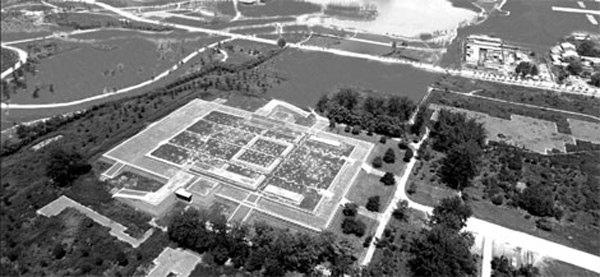In northern Xi'an, capital of Shaanxi province, the Daming Palace ruins are a silent testament to the glory of the Tang Dynasty (618-907).
|

The Daming Palace National Park in Xi'an was the result of a three-year effort by city officials to promote historical heritage.
|
Though most of the imperial structures were destroyed long ago, visitors may still get a sense of the palace's enormity by viewing its foundations.
Daming is one of the country's best-preserved imperial complexes, and argued by many to be one of China's greatest architectural masterpieces.
Xi'an dates back more than 3,100 years, and was the nation's capital for 11 centuries. Today, the Xi'an city government attaches great importance to cultural heritage preservation.
The newly completed Daming Palace National Park is the city's most recent achievement, part of a three-year effort to upgrade its Daobei area.
The palace was listed as a key historical heritage site under the central government's preservation program in its most recent five-year plan ending this December.
Xi'an authorities credited a 2005 meeting of the International Council on Monuments and Sites with guiding the Daming preservation project.
The meeting called for legislation and policies to evaluate, protect and administrate historical sites.
Daming Park was designed by the China Academy of Urban Planning and Design and the Shanghai Tongji Urban Planning and Design Institute in 2007.
Their work highlighted Xi'an's imperial gardens and Tang culture, while incorporating proposals from Israeli, Italian, Australian and Norwegian designers.
The aim was to create "a perfect integration of relics, culture, environment and livelihood," said park planners.
They explained they wanted the area to be attractive to not only professional historians and archaeologists, but also to local residents and tourists.
Originally built with wood and earth, much of Daming Palace has been lost to the elements. But planners rebuilt parts of the structure, installed signs and added vegetation.
The greening projects were designed to help promote clean air and control temperature.
Planners also produced a series of high-tech visual aids to illustrate the site's historical value, including a 3D IMAX film.
While the park is open to the public, experts and technicians are still conducting archaeological surveys to locate relics and unearth foundational structures.
A Daming Palace replica is currently on display at the World Expo in Shanghai. Officials hope it stands as an example of heritage preservation achieved with international cooperation.
(China Daily October 18, 2010)